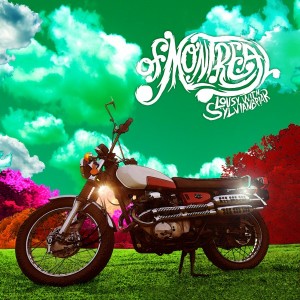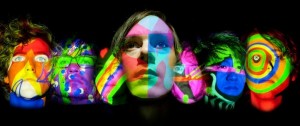![]() BY ALEXANDER BISIGNARO The only constant with the kaleidoscopic indie-pop band Of Montreal — over the course 17 years, 12 albums, nine EPs and innumerable personnel shifts — is change. In its nearly two decades-long evolution from twee psych-pop as second-wave members of the independent Elephant 6 recording collective to its current status as the definitive, post-everything party band for barely 20-somethings, Of Montreal’s mantra has remained the same: Change or die. You can almost chart the changes with a Venn diagram: British invasion bleeds into Beatle-esque psychedelia which bleeds into Bowie glam which bleeds into Prince-style funk. The just-released Lousy With Sylvianbriar, their strongest in years, feels like a return to the ’60s influences of their early albums, like the circle remains unbroken. But you really have to see them live to ‘get’ them. Their flair for outrageous spectacle doubles the music’s power to charm and arouse. Lucky for you they play Union Transfer on Friday, which is why we got Of Montreal mainman Kevin Barnes on the horn to talk about the new album and the 16 years long evolution that made it possible.
BY ALEXANDER BISIGNARO The only constant with the kaleidoscopic indie-pop band Of Montreal — over the course 17 years, 12 albums, nine EPs and innumerable personnel shifts — is change. In its nearly two decades-long evolution from twee psych-pop as second-wave members of the independent Elephant 6 recording collective to its current status as the definitive, post-everything party band for barely 20-somethings, Of Montreal’s mantra has remained the same: Change or die. You can almost chart the changes with a Venn diagram: British invasion bleeds into Beatle-esque psychedelia which bleeds into Bowie glam which bleeds into Prince-style funk. The just-released Lousy With Sylvianbriar, their strongest in years, feels like a return to the ’60s influences of their early albums, like the circle remains unbroken. But you really have to see them live to ‘get’ them. Their flair for outrageous spectacle doubles the music’s power to charm and arouse. Lucky for you they play Union Transfer on Friday, which is why we got Of Montreal mainman Kevin Barnes on the horn to talk about the new album and the 16 years long evolution that made it possible.
PHAWKER: Early on, like a lot of Elephant 6 bands, Of Montreal’s early sound was Beatle-ish psych-pop, but over the years you’ve broadened your palette to include Bowie-esque glam and Prince-style funk. Can you talk about the evolution of the band’s sound?
KEVIN BARNES: Yeah, I mean, initially it was bands like The Kinks and other British invasion bands like that, and then it got more into conceptual pop stuff like Beach Boy’s Smile and Frank Zappa, and then you know a little bit of progressive influences like King Crimson. But in the early days it was often children’s music, you know, all the music was basically twisted children’s stories. And then we started getting more into funk and R&B music and glam, so as we have sort of taken off, the show got bigger. We had gender bending, glamorous costumes, lots of confetti, all this glitter, and things like that. And we did that for a while and now we’re kind of evolving into something new that hasn’t really taken a defined shape, but musically, the new record – it’s not really what you’d consider funk R&B or glam, if anything it’s kind of – well I’m not really sure what it is, but I guess it’s more in common with Bob Dylan or Leonard Cohen.
PHAWKER: The new album sounds like a return to the 60’s influenced organic rock sound of the early albums and was recorded on a real-deal 24-track analog recorder. Explain the sonic and aesthetic choices you made for  this record.
this record.
KEVIN BARNES: I wanted to make a band record. I wanted to make a record that sort of follows the rules – or the limitations – of my favorite records, the classic records of the 60s and 70s. I wanted to make a record on analog. I wanted it to be mostly live where the band was in the room together. I wanted to take the initial period of time working with the energy, working together in my home studio for about two to three weeks. I wanted it to feel more spontaneous and communal than the past couple of records have. Because the past couple of records I have basically pieced together myself and if someone was collaborating with me, I would just send an email to them and they would send an email back to me. It was just a big disconnect. I wanted anybody working on the record to have to be there, because we couldn’t email things, it just couldn’t work that way when you’re recording to tape. So I wanted to have those limitations and I wanted to use them for our benefit. Actually t’s not really a limitation, but it’s forcing ourselves out of our comfort zone and forcing ourselves to work the way that people used to have work. And, in my mind – and I have nothing against contemporary music – but the records I go back to are from the late ’60s, early ’70s, mid ’70s, and even some in the ’80s. But I do think that it was because it was a human being playing every instrument, and people were actually singing everything. I like the aspect of those records where everything was really raw and the personality of each musician really shines through. It was more of a group effort. I wanted to make a record like that. I got a group of people together, some of which I haven’t even worked with before but whose talent I respected and who I was excited about working with and I was excited to see what they could do with my songs. And basically we formed a new band for this record.
PHAWKER: I read that you wrote the songs during a ‘self-imposed isolation experiment in San Francisco.’ Can you explain the how and why of that?
KEVIN BARNES: Sure. Yeah man, during the last tour, when we were touring for the last record and everyone was done, I was thinking about what I was going to do next or where I wanted to go. You know, moving forward. Something sat in my mind that I should go to San Francisco. And I think that’s because a lot of the inspirations of the record are coming from the late ’60s, the counter culture and music scene of the late ’60s which was great scene in San Francisco at that time, and not just musically, but also culturally, politically, and everything. So I think, you know, for me, I wanted to be at the epicenter of the scene that I was facing. So it made sense to go there. And I’ve been there many times but I have never stayed there for an extended period of time. I usually just play a show and leave the next day or whatever. So it was great to just be there. I was there for about three weeks and I rented this apartment and just sort of wandered around. I just read a lot and wrote a lot of songs. At first it was a little bit awkward because I didn’t know what I really wanted to do. I had a couple of fragmented ideas of what I wanted to do in my mind that I was working to. But once I sort of hit my stride, then all of these songs started appearing in my mind. I’d wake up with a song on my mind and I’d go to bed with a song on my mind. It was good because I was able to focus all of my energy. You know, it was really just when you go somewhere new and you really don’t know anybody and you just spend a lot of time in your own head.
PHAWKER: You’ve said that Sylvia Plath, the Grateful Dead, Neil Young, and the Flying Burrito Brothers influenced the new album. How did that particular combination of influences come together and what did you draw from each of those artists? Can we go through each of those one by one and you can tell me what, in your opinion, makes them great or important or still relevant after all these years?
KEVIN BARNES: Sylvia Plath became important to me around the time I was working on the record. I really started getting into her back-story, learning about her tragic life, sort of romanticizing her story in a way, and just really getting into her writing. It’s like with everything, it’s all sort of this hazy thing as far as what you’re being inspired by from a specific person or band. It’s like everything is inspiring, the concept of them is inspiring, and the same thing I can say with The Grateful Dead, Gram Parsons, and Neil Young. Well, with those guys, as musicians, I can sort of connect with on a more basic level by appreciating what they did with music. Especially with Neil  Young, you know, I think he’s such an incredible writer and performer, and what he can do with just an acoustic guitar, his voice, and a harmonica – same with Bob Dylan and Leonard Cohen. I was definitely very inspired by artists like that who could knock you out with just an acoustic guitar and vocals. And it’s basically all about the vocals, it’s all about the presence of the voice and the emotion of the voice. So I wanted all of the songs to be able to stand up in that way, to be able to stand up in that context where it’s just me with an acoustic guitar. It’s better than needing all of that ornamental stuff. It sort of makes the songs more legitimate. This is sort of a songwriter’s kind of record.
Young, you know, I think he’s such an incredible writer and performer, and what he can do with just an acoustic guitar, his voice, and a harmonica – same with Bob Dylan and Leonard Cohen. I was definitely very inspired by artists like that who could knock you out with just an acoustic guitar and vocals. And it’s basically all about the vocals, it’s all about the presence of the voice and the emotion of the voice. So I wanted all of the songs to be able to stand up in that way, to be able to stand up in that context where it’s just me with an acoustic guitar. It’s better than needing all of that ornamental stuff. It sort of makes the songs more legitimate. This is sort of a songwriter’s kind of record.
PHAWKER: How about the Flying Burrito Brothers?
KEVIN BARNES: They’re cool because they sort of made country music cool for the people who were part of the hippie scene, you know, that sort of revolutionary scene from that time period. You know they’ve influenced many bands because they were one of the originators of young, outlaw country. You know, it was the generation after Johnny Cash and people like that where they would bring country music to people and make it relevant. Like, there were draft-dodging songs and songs about drugs. And Gram Parsons has this incredible voice and I think the musicianship is just incredible. I’ve heard a lot of live records of theirs that are just incredible. I think that’s why I was really into them.
PHAWKER: Where did your flair for really ornate word play and obscure word choices come from?
KEVIN BARNES: Well I think like anybody who takes it seriously, you want to say things in a direct way but not an obvious way. You don’t want to be predictable. I read a lot of poetry so it is something I take a lot of pride in and spend a lot of time on. As far as other influences, I was definitely influenced by Dylan Thomas who is kind of all over the place. Really I read a lot of things that are all over the place.
PHAWKER: Alright, final question. What’s the last thing you heard — old or new — that totally blew your mind?
KEVIN BARNES: Well the most recently released record that I connected with was the Tame Impala album Lonerism. Every song is really great. It’s an interesting album because it’s not like a straight pop record. There are so many interesting things happening sonically. The lyrics are always kind of interesting and his voice sounds like a believable voice, it’s not a phony thing. The production of the record sounds great, I like the way the bass sounds. You know I’m a recording engineer myself, so I’m picking up those little things. I just really like the way the record sounds and I think the songs are great.

